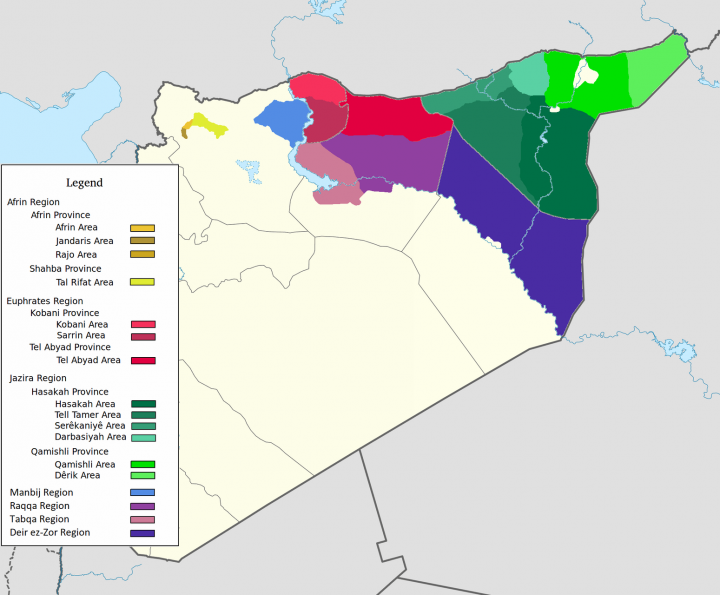Have you ever heard of Rojava, the semiautonomous Kurdish region in North West Syria? Probably not, or you may have seen a recent article/letter in The Guardian from relatives of British people who went to join the US-backed Kurdish effort to fight ISIL (several died) and now are treated like terrorists by the British Home Secretary, threatening long jail sentences when they come back.
Rojava (aka the Autonomous Administration of North and East Syria) is, however, extremely interesting as one of the most creative experiments in direct Democracy, federalism, co-operative economy, gender equality, LGBT and multiethnic rights (although Kurdish dominated there are also Arabs, Assyrians and other smaller ethnic groups – Muslims, Jews and Christians) taking place in the world, all in the midst of the Syrian war and determined attempts by ISIL to expand their caliphate into their territory, which they fought with great determination, suffering around 10,000 deaths. In spite of acknowledging their central role in defeating ISIL locally and the international support they have received, their project is under threat from Turkey, and not at all clear what will be the Syrian central government’s attitude once the war is over. And they were not invited to Geneva for the peace talks as Turkey opposed it.
Perhaps it is precisely their success in creating a pocket of decentralised politics, gender equality and co-operative and green economics that make those with authoritarian tendencies feel uneasy. There are around 4 million people participating in this experiment.
David Graeber, Anthropology Lecturer from the London School of Economics went to visit a few years ago and has been writing articles about it for The Guardian, the New York Times and other publications in spite of which the project remains largely ignored. With some exceptions as they count now on the support of the British cooperative movement.
Graeber’s father had gone, together with many European young people (like George Orwell) to Spain to fight against fascism as WWII was developing its roots and Graeber sees lots of parallels with the young idealists who went to fight with the Kurds against ISIL. What he saw was how a movement somehow emerging from Marxism was inspired to develop a system more akin to libertarian socialism, or anarchism, inspired on a number of sources. Debbie Bookchin (also an inspiration for Barcelona’s mayoress Ada Colau) and feminist theory, and Abdullah Öcalan, PKK leader serving a life sentence in Turkey (he was sentenced to death but commuted as Turkey was interested in becoming an EU member), are the central ones.
“They decided that rather than demanding a state of their own, they wished to simply make borders irrelevant and dissolve away states entirely. And it’s kind of made sense to people in that part of the world. Remember the Kurds are a population who are divided between Iran, Iraq, Syria, and Turkey. The idea they are somehow carving a government out of that seems unlikely. And they also make the rather … a point you hear a lot of, actually, people will say, “Well, you know, we’ve come to realize in this part of the world, demanding your own country is basically the same as ‘I demand the right to be tortured by secret policemen speaking my own language’.” It’s not much of a demand. So they’ve come around to this idea of bottom-up direct democracy and sort of eliminating borders as the best way that they can come up with something like a Kurdistan that would make sense.” Mesopotamia Coop interview to David Graeber.
Rojava has its own University: “Young people in that region were historically excluded from higher education by the regime,” said Rana Khalaf, author of a paper on Rojava’s institutions. “If they wanted to study, they had to go to Aleppo. This meant that girls could not study, because their families would not allow them to commute between the two places.”At the end of its second year, Rojava University had 720 students and 127 faculty members, according to Massoud Mohammed, a media spokesman for the university.” “A CO-OPERATIVE REVOLUTION IS HAPPENING IN NORTHERN SYRIA. People in Rojava are collectively building a society based on principles of direct democracy, ecology, and women’s liberation, with co-operation playing a crucial role in rebuilding their economy. In Bakur (the predominantly Kurdish region of eastern Turkey) people are setting up co-operatives within a similar democratic model, despite ongoing military repression by the state of Turkey.” Mesopotamia Coop
Carne Ross (30 September 2015). “The Kurds’ Democratic Experiment”. New York Times: “For a former diplomat like me, I found it confusing: I kept looking for a hierarchy, the singular leader, or signs of a government line, when, in fact, there was none; there were just groups. There was none of that stifling obedience to the party, or the obsequious deference to the “big man”—a form of government all too evident just across the borders, in Turkey to the north, and the Kurdish regional government of Iraq to the south. The confident assertiveness of young people was striking.”
Rojava has many critics, as any functioning alternative to capitalism would have, and its future in such an unstable region is uncertain, but by reaching out for solidarity and showing themselves as a demonstration effect of what can be achieved through an evolving commitment to a society built from the bottom up they are increasing their chances of inspiring other parts of the Syrian society in the post war reconstruction effort, and other parts of the world.










